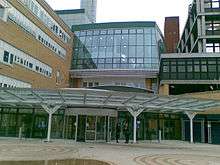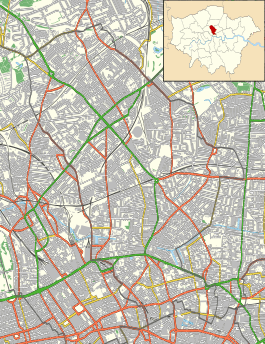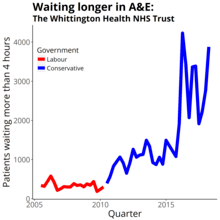Whittington Hospital
| Whittington Hospital | |
|---|---|
| The Whittington Hospital NHS Trust | |
 | |
 Location within Islington | |
| Geography | |
| Location |
Upper Holloway, London, N19 United Kingdom |
| Coordinates | 51°33′59″N 0°08′22″W / 51.5665°N 0.1395°WCoordinates: 51°33′59″N 0°08′22″W / 51.5665°N 0.1395°W |
| Organisation | |
| Care system | NHS England |
| Hospital type | Acute hospital trust |
| Affiliated university | University College London |
| Services | |
| Emergency department | Yes |
| Beds | 360 |
| History | |
| Founded |
1473 activity on site 1848 current hospital |
| Links | |
| Website | http://www.whittington.nhs.uk/ |
The Whittington Hospital is a district general and teaching hospital of UCL Medical School and Middlesex University School of Health and Social Sciences. Located in Upper Holloway, it is named after Sir Richard Whittington, an English merchant, and managed by The Whittington Hospital NHS Trust, operating as Whittington Health, an integrated care organisation providing hospital and community health services in the north London boroughs of Islington and Haringey.
History
Although medical services have been delivered on the site since the foundation of a leper colony in 1473, the current hospital has its origins in the Small Pox and Vaccination Hospital, built in 1848.[1] Independently managed hospitals were founded on the Archway site in 1877 and the Highgate site in 1866. All three hospitals were brought together under the control of the newly formed North West Metropolitan Regional Hospital Board in 1946 and collectively formed the Whittington Hospital in 1948.[1]
St. Mary's Wing
The Small Pox and Vaccination Hospital was designed by the architect Samuel Daukes as one of two isolation hospitals in London (the other was the London Fever Hospital in Liverpool Road) intended to care for smallpox patients during the epidemic at that time. It closed in 1896 and was officially re-opened as a workhouse infirmary in 1900 by the Duke and Duchess of York.[1]
| Date | Institution | Management |
|---|---|---|
| 1848 | Small Pox and Vaccination Hospital | Metropolitan Asylums Board |
| 1900 | Highgate Hill Infirmary | Islington Guardians of the Poor |
| 1914 | Islington Infirmary | Islington Guardians of the Poor |
| 1930 | St. Mary's Hospital | London County Council |
The past 50 years have seen the consolidation of all clinical services onto the St. Mary's wing on Highgate Hill. In 1977, a new block opened containing Accident and Emergency, followed by the Great Northern Building in 1992. In 2006, work was completed on the construction of a new clinical block and main entrance on Magdala Avenue. The former smallpox hospital, now known as the Jenner Building, is currently in use as office accommodation.[1]
Highgate Wing
Florence Nightingale advised the architects on the design of the St. Pancras Infirmary building and later commented that it was "by far the best of any workhouse infirmary we have"[2] and indeed “the finest metropolitan hospital”.[3] Edith Cavell was employed at the hospital as night superintendent for three years.[4]
| Date | Institution | Management |
|---|---|---|
| 1866 | St. Pancras Union Infirmary | St. Pancras Guardians of the Poor |
| 1869 | Central London Sick Asylum | Central London Sick Asylum District |
| 1893 | St. Pancras North Infirmary | St. Pancras Guardians of the Poor |
| 1930 | Highgate Hospital | London County Council |
Latterly a psychiatric hospital, in 2004, the Highgate wing on Dartmouth Park Hill was chosen by Camden and Islington Community NHS Trust as the site for Highgate Mental Health Centre and the consolidation and development of community mental health and adult social care services.[5]
Archway Wing
Holborn Union Infirmary was designed by the architect Henry Saxon Snell, who was responsible for a number of other workhouse infirmaries in the capital. In 1928, the hospital took over the Prudential Assurance Company's Furnival House hostel for domestic servants in Cholmeley Park for use as a nurses' home.[6]
| Date | Institution | Management |
|---|---|---|
| 1877 | Holborn Union Infirmary | Holborn Guardians of the Poor |
| 1921 | Holborn and Finsbury Hospital | Holborn Guardians of the Poor |
| 1930 | Archway Hospital | London County Council |
In 1998, the Archway wing on Archway Road was jointly purchased by University College London and Middlesex University to form the Archway campus. The teaching and research facility closed in 2013 and the site was sold to the Peabody Trust for redevelopment.[7]
Performance

Following an inspection in December 2015 of the Trust and its services, Whittington Health was rated as Good by the Care Quality Commission in July 2016 – with caring rated as Outstanding[8] The Trust has a current deficit of £5.9m for the year ending 2016/17 – £200k worse than its planned position.[9]
See also
References
- 1 2 3 4 "St Mary's Hospital". Lost Hospitals of London. Retrieved 2 July 2018.
- ↑ McDonald, Lynn (2004). Florence Nightingale on Public Health Care: Collected Works of Florence Nightingale. 6. Wilfrid Laurier University Press. p. 447. ISBN 978-0889204461.
- ↑ "Firing squads, hammers and spies: Trust's Tales". Camden & Islington News. 2014. p. 8.
- ↑ "Whittington Health remembers Highgate nurse Edith Cavell". Whittington Health. 12 October 2015. Retrieved 2 July 2018.
- ↑ Foot, Tom (17 March 2011). "Lost souls beyond a plush entrance to Highgate Mental Health Centre". Camden New Journal. Retrieved 2 July 2018.
- ↑ "Furnival House". Historic England. Retrieved 31 March 2017.
- ↑ "Archway Campus site background". The Governors of the Peabody Trust. Retrieved 31 March 2017.
- ↑ "Whittington Health rated as "Good" by CQC". whittington.nhs.uk. Retrieved 23 October 2017.
- ↑ "Trust Board Papers". The Whittington Hospital NHS Trust. 1 March 2017. Retrieved 1 July 2018.
External links
- "Our history". The Whittington Hospital. Retrieved 29 August 2014.